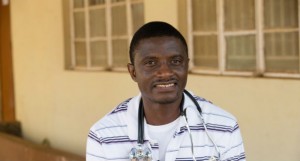Doc who died from Ebola endured treatment delays

In this April 2014 photo provided by the United Methodist News Service, Dr. Martin Salia poses for a photo at the United Methodist Church’s Kissy Hospital outside Freetown, Sierra Leone. AP/United Methodist News Service, Mike DuBose
OMAHA, Nebraska — A surgeon who contracted Ebola in his native Sierra Leone did not receive aggressive treatment until nearly two weeks after he first started showing symptoms — a delay that doctors said probably made it impossible for anyone to save his life.
Dr. Martin Salia was in the 13th day of his illness when he reached the University of Nebraska Medical Center in Omaha on Saturday. He had waited three days to be formally diagnosed after an initial test for Ebola came back negative. He then waited five more days to be flown to the United States.
By the time the 44-year-old Maryland man got to Omaha, the deadly virus had done too much damage, shutting down Salia’s kidneys and making breathing difficult, doctors said. He died Monday.
“In the very advanced stages, even the modern techniques we have at our disposal are not enough to help these patients once they reach a critical threshold,” said Dr. Jeffrey Gold, chancellor of the medical center.
The virus has already killed more than 5,000 people in West Africa.
Article continues after this advertisementSalia, who chose to work in his native country despite more lucrative opportunities elsewhere, was first tested for Ebola on Nov. 7, but the test was negative, and he was discharged from a treatment center in Sierre Leone.
Article continues after this advertisementIt’s not unusual to see false negative tests for Ebola in the early stages because the amount of the virus in the bloodstream is still low, said Dr. Phil Smith, an infectious-disease expert who leads the Nebraska Medical Center’s biocontainment unit.
The U.S. government warns doctors to be wary of possible false negative tests for Ebola.
Salia tested positive for the disease on Nov. 10 but did not arrive at the Omaha hospital until Saturday.
Two other Ebola patients treated in Omaha in recent months arrived at the hospital roughly a week earlier in their illnesses, before nausea, vomiting and more serious symptoms had set in. Both of those men recovered.
Government officials in Sierra Leone promised a full investigation into the treatment Salia received.
“At this point, we can’t say for certain whether it was this misdiagnosis or not that led to his death,” Deputy Information Minister Theo Nicol said in a statement to The Associated Press. The government planned to request a full medical report from the hospital where he was last treated.
Salia, a permanent U.S. resident, was reportedly receiving blood from an Ebola survivor while in Sierra Leone, the government statement said. The treatment is believed to provide antibodies to fight the virus.
The government statement questioned whether “the strain of the 16-hour trip could have had a negative impact on his recovery.”
Doctors with an air-transport service assessed Salia in Sierra Leone last week before deciding he was stable enough for the long flight to Nebraska.
In Omaha, Salia was placed on kidney dialysis and a ventilator and was given several medications, the hospital said in a statement. He was given the experimental Ebola drug ZMapp on Saturday and received another plasma transfusion from an Ebola survivor.
Salia’s wife, Isatu Salia, who lives in Maryland, said Monday that the family believed he was treated “in the best place possible.”
But by the time her husband arrived in Omaha, he was already unresponsive, doctors said.
In a Friday telephone interview, she said she had spoken to her husband and prayed with him. Although his voice sounded weak and shaky, she said he told her “I love you” in a steady voice.
Salia graduated from the Pan African Academy of Christian Surgeons training program in 2008. He was free to practice anywhere he wanted, but he chose to stay in his native Sierra Leone, where the need for surgeons is immense.